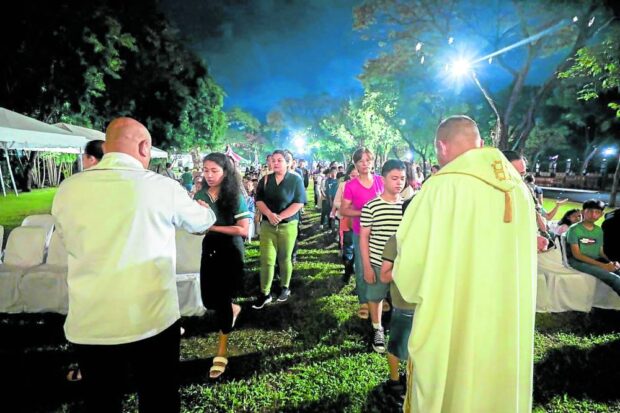Palace gates again opened for ‘Simbang Gabi’

FESTIVITY BEFORE DAWN | Malacañang is opened to the public at the start of the “Simbang Gabi,” or dawn Masses, on Dec. 16, 2023. (Photo from the Presidential Communications Office)
MANILA, Philippines — Carnival rides for children, colorful lanterns, and a giant Christmas tree for “selfies” as well as a chance to attend the traditional nine-day “Simbang Gabi,” or dawn Masses, at the open area of Malacañang Palace have been made available again to the public.
Just like last year, Filipinos will have the chance to experience the holiday season at the country’s seat of power after President Marcos opened the Kalayaan grounds for the annual “Tara sa Palasyo” festivities.
The Presidential Communications Office (PCO) said the daily Masses would start at 4:30 a.m. at the open area of Malacañang.
After the Mass, visitors would be treated with snacks of “puto bumbong” and “bibingka.” These are two varieties of steamed rice cakes categorized by Filipinos as “kakanin” (sweetened rice-based snacks), usually sold by vendors outside churches during dawn Masses for parishioners who haven’t had breakfast yet.
The annual Tara sa Palasyo, which is loosely translated “let’s go to the Palace,” started in 2022. It is described as an event “where tradition meets festivity in the heart of Malacañang.”
Article continues after this advertisementThe Palace said in a statement it is inviting Filipinos from all walks of life “to witness a time-honored tradition initiated by former President Ferdinand E. Marcos and first lady Imelda R. Marcos.”
Article continues after this advertisement“Simbang Gabi” is a Filipino Christmas tradition that originated in the 17th century, introduced by the Spanish friars as a way for farmers to attend Mass before they start their work in the fields. In Spanish, it is called “Misa de Gallo,” or “Mass of the Roosters.”
READ: ‘Simbang Gabi’ not about time but participation, says prelate
Christmas tree, lanterns
Besides attending the dawn Masses, people would also have the chance to view the Christmas tree and lantern displays at the Kalayaan grounds daily from 6 p.m. to 11 p.m. until Dec. 23.
The PCO said the lanterns, or “parol,” displayed were crafted by students during the National Parol Competition.
The Palace also put up rides for children to enjoy at the Kalayaan grounds.
“This year promises a jubilant celebration with carnival rides, engaging games, and delectable food, creating an atmosphere of joy and camaraderie,” the Palace said.
Malacañang said more than 21,000 Filipinos attended the festivities last year.
President Marcos also surprised visitors when he shook hands and accommodated the taking of pictures.
Last month, Mr. Marcos and first lady Liza Araneta Marcos welcomed in Malacañang about 1,700 children from selected shelters nationwide for a gift-giving drive.
During the event, the President remembered his childhood and the gatherings that his father used to organize during the Christmas season.
“Christmas is really about the children. And we always have a merry Christmas when the children have a good Christmas. [When] we see your smiles, saying ‘Merry Christmas’ has meaning,” he said.
Wear face masks
Meanwhile, Cardinal Jose Advincula, Manila Archbishop, has urged churchgoers to wear masks and observe health protocols when attending Simbang Gabi, following reports of a spike in COVID-19 and other respiratory ailments in the country.
In a Dec. 15 circular, Advincula reminded members of the clergy and the laity to keep their masks on while attending the nine-day dawn Masses to help curb the transmission of COVID-19, especially to those considered vulnerable to illnesses, or those with weakened immunity.
He also advised those experiencing symptoms to stay at home “so as not to spread the infection.”
This, the prelate noted, was in compliance with the recommendations made by the Ministry on Health Care of the Archdiocese of Manila.
“We continue to receive reports about incidences of COVID-19 and other respiratory illnesses. But we will not allow them to deprive us of Christmas joy,” he said.
On Friday, Health Secretary Teodoro Herbosa said the Department of Health is not keen on pushing for the return of mandatory masking, despite a gradual increase in COVID-19 cases.